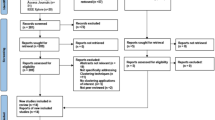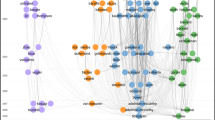Abstract
A research program for modeling the information spaces that exist in separate subject areas of research, which includes the selection of terms, grouping them into term fields, and study of the temporal dynamics of term field updating, is described. Basing on an algorithm of fuzzy clustering C-means, the cluster model of research directions of a research team and the mapping of its scientific interests is proposed. The presented models can be used for planning the activities of members of scientific teams.
Similar content being viewed by others
References
Egghe, L., On the correction of the h-index for career length, Scientometrics, 2013, vol. 96, pp. 563–571.
Glanzel, W., The role of core documents in bibliometric network analysis and their relation with h-type indices, Scientometrics, 2012, vol. 93, pp. 113–123.
Hirsch, J.E., An index to quantify an individual’s scientific research output that takes into account the effect of multiple coauthorship, Scientometrics, 2010, vol. 85, pp. 741–754.
Nederhof, A.J., van Leeuwen, T.N., and van Raan, A.F.J., Highly cited non-journal publications in political science, economics and psychology: A first exploration, Scientometrics, 2010, vol. 83, pp. 363–374.
van Leeuwen, T.N., Moed, H.F., and Reedijk, J., Critical comments on institute for scientific information impact factors: A sample of inorganic molecular chemistry journals, J. Inform. Sci., 1999, vol. 25, pp. 489–498.
Bordons, M. and Mauleón, E., Male and female involvement in patenting activity in Spain, Scientometrics, 2010, vol. 83, pp. 605–621.
Costas, R. and Bordons, M., Do age and professional rank influence the order of authorship in scientific publications? Some evidence from a micro-level perspective, Scientometrics, 2011, vol. 88, pp. 145–161.
Mauleón, E., Hillán, L., Moreno, L., Gómez, I., and Bordons, M., Assessing gender balance among journal authors and editorial board members, Scientometrics, 2013, vol. 95, pp. 87–114.
Bordons, M., Romero, F., Zulueta, M.A., and Barrigon, S., Measuring interdisciplinary collaboration within a university: The effects of the multidisciplinary research program, Scientometrics, 1999, vol. 46, pp. 383–398.
Rinia, E.J., van Leeuwen, T.N., Bruins Eppo, E.W., van Vuren Hendrik, G., van Raan, A.F.J., Measuring knowledge transfer between fields of science, Scientometrics, 2002, vol. 54, pp. 347–362.
van Leeuwen, T.N., Strength and weakness of national science systems: A bibliometric analysis through cooperation patterns, Scientometrics, 2009, vol. 79, pp. 389–408.
Tijssen, R.J.W. and van Leeuwen, T.N., Measuring impacts of academic science on industrial research: A citation-based approach, Scientometrics, 2005, vol. 66, pp. 55–69.
Starodubov, V.I., Kurakova, N.G., Tsvetkova, L.A., Aref’ev, P.G., and Kurakov, A.F., The problems associated with the evaluation of world class competitiveness of Russia’s science, as illustrated by clinical medicine, Sci. Techn. Inform. Proc., 2012, vol. 39, pp. 139–152.
Kotsemir, M.N., Dynamics of Russian and World science through the prism of international publications, Foresight-Russia, 2012, vol. 6, no. 1, pp. 38–59.
álvarez-de-Toledo-Saavedra, L., Bibliographic control and dissemination of the university of Oviedo scientific output, El Profesional de la Informacion, 2012, vol. 21, pp. 639–642.
Moskaleva, O.V., Mozhno li otsenivat’ trud uchenykh po bibliometricheskim pojazatelyam? Upravlenie bol’shimi sistemami. Spetsial’nyi vypusk 44: Naukometriya i ekspertiza v upravlenii naukoi (Is It Possible to Estimate the Work of Scientists According to Bibliometric Coefficients? Large System Management. Special Number 44: Scientology and Examination in Science Management), 2013, pp. 308–331.
Alekseeva, L.M., Isaeva, E.V., and Mishlanova, S.L., Metaphor in computer virology discourse, World Appl. Sci. J., 2013, No. 27 (4), pp. 533–537.
Arano, S., Thesauruses and Ontologies, Hipertext.net. 2005, no. 3. http://eprints.rclis.org/8972/2/12.pdf. Accessed August 20, 2013.
Wielinga, B.J., Schreiber, A.Th., Wielemaker, J., and Sandberg, J.A.C., From thesaurus to ontology, K-CAP’ 01: Proc. 1st Int. Conf. on Knowledge Capture, ACM New York, 2001, pp. 194–201.
Belousov, K.I., Mishlanova, S.L., and Zasedateleva, M.G., Thesaurus simulation of subject area “Competent approach”: Design of research and program realization on the IS “Semograf” platform, Innovat. Proekty Program. Obraz., 2013, vol. 4, pp. 3–10.
Gladun, A.Ya. and Rogushina, Yu.V., Use of ontological knowledge and thesaurus for object profiling of specialists, Iskusstv. Intell., 2006, No. 3, pp. 379–390.
Morozova, L.A., Terminoznanie: Osnovy i metody (Term Knowledge: Foundations and Methods), Moscow: Prometei, 2004.
Kuznetsov, A.M., Ot komponentnogo analiza k komponentnomu sintezu (From Component Analysis to Component Synthesis), Moscow: Nauka, 1986.
Shchur, G.S., Teorii polya v lingvistike (Field Theories in Linguistics), Moscow: Editorial URSS, 2009.
Baranov, D.A., Belousov, K.I., Vlatskaya, I.V., and Zelyanskaya, N.L., Inventor’s Certificate registered in Program Register for Computers, No. 20111617192 from 15.09.2011.
Belousov, K.I. and Zelyanskaya, N.L., Ontology and ontography of partially scientific subject regions and scientific picture of world, Vestn. Permsk. Univ. Ross. Zarubezh. Filolog., 2012, No. 4, pp. 104–111.
Belousov, K.I., Zelyanskaya, N.L., and Baranov, D.A., Conceptual-hypertext model of content management in IS “Semograf”, Vestn. Orenburg. Gos. Univ., 2012, No. 11, pp. 59–64.
Erofeeva, E.V. and Erofeeva, T.I., The person and the text: The anthropocentric approach to research, Vestn. Permsk. Univ. Ross. Zarubezh. Filolog., 2010, No. 4, pp. 28–33.
Dotsenko, T.I., Associative-verbal network in context of intercultural communication, Filolog. Zamet., 2012, Ch. 1, pp. 147–157.
Erofeeva, E.V. and Pepelyaeva, E.A., Structure of the semantic field “human” in the mental lexicon of Russian native speakers, Vestn. Permsk. Univ. Ross. Zarubezh. Filolog., 2011, No. 1, pp. 7–19.
Erofeeva, E.V. and Khudyakova, E.S., The Psycholinguistic research of the bilingual’s system of values (on the data of the thematic group “Human”, Vestn. Permsk. Univ. Ross. Zarubezh. Filolog., 2012, No. 2, pp. 7–16.
Erofeeva, E.V., Differentiation and integration of sociolects: to the problem of social factors interaction, Vestn. Permsk. Univ. Ross. Zarubezh. Filolog., 2010, No. 5, pp. 39–47.
Erofeeva, E.V., Group identity and its reflection in the internal lexicon, Vestn. S.-Peterb. Univ. Ser. 9: Filolog. Vostokoved. Zhurnal., 2011, No. 1, pp. 91–96.
Erofeeva, E.V. and Avtukhovich, Yu.E., The influence of gender on selecting verb aspect forms, Global. Nauchn. Potent., 2012, No. 18, pp. 143–145.
Garanovich, M.V. and Erofeeva, T.I., Dictionaries of urban subcultural formations, Global. Nauchn. Potent., 2012, No. 18, pp. 139–142.
Erofeeva, E.V., The influence of speciality on the structure of language picture of the world, Filolog. Zamet., 2012, vol. 2, pp. 229–245.
Dotsenko, T.I., Erofeeva, E.V., and Erofeeva, T.I., Perm school of sociolinguistics: Theoretical and methodological foundations, Vestn. Permsk. Univ. Ross. Zarubezh. Filolog., 2010, No. 2, pp. 144–155.
Erofeeva, T.I., Local unit in the city literature language as a result of the dialog of two language systems, Vestn. Leningrad. Gos. Univ., 2010, vol. 1, no. 3, pp. 71–78.
Erofeeva, T.I., Socialect as a method of a linguistic situation of a region description, Vestn. Permsk. Univ. Ross. Zarubezh. Filolog., 2010, No. 1, pp. 21–25.
Author information
Authors and Affiliations
Corresponding author
Additional information
Original Russian Text © K.I. Belousov, D.A. Baranov, N.L. Zelyanskaya, 2014, published in Nauchno-Technicheskaya Informatsiya, Seriya 1, 2014, No. 4, pp. 13–26.
About this article
Cite this article
Belousov, K.I., Baranov, D.A. & Zelyanskaya, N.L. A research team and its subject area: Towards the question of the effective planning of scientific activities. Sci. Tech.Inf. Proc. 41, 85–97 (2014). https://doi.org/10.3103/S0147688214020026
Received:
Published:
Issue Date:
DOI: https://doi.org/10.3103/S0147688214020026




